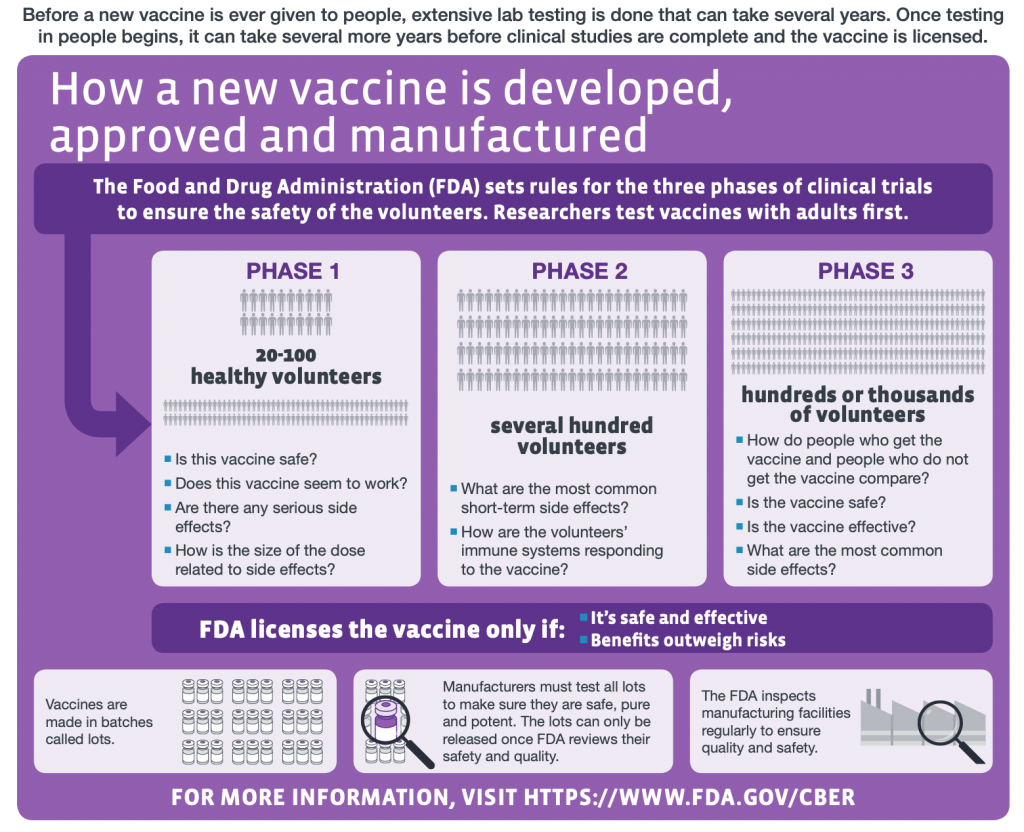

BEHAUPTUNG: “Today the FDA announced they approved a drug whose Phase III clinical trials are not expected to be completed for two more years”
REVIEW
In December 2020, the Pfizer-BioNTech COVID-19 vaccine became the first COVID-19 vaccine authorized for emergency use in the U.S. Since then, the country has administered more than 202 million doses of this vaccine to its population. On 23 August 2021, the Pfizer-BioNTech COVID-19 vaccine reached a new milestone by receiving the first full approval of a COVID-19 vaccine in the U.S. This vaccine, which will be now marketed as Comirnaty, is approved for people aged 16 and older but remains under Emergency Use Authorization (EUA) for people aged 12 to 15 and as boosters.
But despite full approval by the U.S. Food and Drug Administration (FDA), posts claiming that the Pfizer-BioNTech COVID-19 vaccine is experimental continued circulating on social media. One example is this meme published by the chiropractor Benjamin Benulis on his Facebook and Instagram accounts the same day of the FDA approval. In the meme, Benulis claimed that „Phase 3 trials [of the vaccine] are not expected to be completed for two more years“. The meme was widely shared on both social media platforms, receiving more than 15,000 interactions.
Health Feedback explained in earlier reviews that the three COVID-19 vaccines authorized for emergency use in the U.S. demonstrated their safety and efficacy in several stages of clinical trials. The results from Phase 3 trials are published in peer-reviewed scientific journals[1-3]. In fact, a new vaccine can only receive approval or EUA after having completed Phase 3 trials. Therefore, the claim that the Pfizer-BioNTech COVID-19 vaccine is still undergoing Phase 3 trials is inaccurate.
The development of a new vaccine is a complex process that involves different stages of preclinical studies and clinical trials. First, researchers screen for the best possible antigen, which is any natural or synthetic substance with the potential to induce an immune response in the body. Next, the vaccine candidate containing the selected antigen is tested in cells and animals to determine if it can generate an immune response and is safe. Only those candidates that showed to be safe and effective in preclinical studies can move into clinical trials in people.
Promising vaccine candidates then undergo three phases of clinical trials to evaluate their safety and efficacy in humans (see Figure 1). In Phase 1, a small number of participants receive the vaccine candidate to confirm that it is safe in humans. Phase 2 aims to evaluate the candidate’s safety and its ability to generate an immune response in a larger group of participants—typically several hundred—of a similar age and health condition to those who will receive the vaccine in the future. Finally, Phase 3 evaluates the safety and efficacy of the vaccine candidate in thousands of people. This last phase generally involves trials across multiple countries to ensure that the vaccine is safe and effective in different populations. At this point, the collected data are sufficient for evaluating the vaccine’s safety and effectiveness, and developers can apply for FDA approval.

Figure 1. The different stages of human clinical trials in vaccine development (modified from the original graphic by the U.S. Centers for Disease Control and Prevention).
Phase 2 and particularly Phase 3 trials usually include a group of people who don’t receive the vaccine or receive a pre-existing vaccine. This group serves as a control to evaluate whether the new candidate is safer and more effective than no vaccine or the standard vaccine, if available. In addition, these trials are generally double-blind, which means that neither the participants nor the scientists conducting the study know which group the participant belongs to until the trial is completed. Blinding makes it less likely that factors unrelated to the study, like changes in behavior, influence the results of the study.
Phase 3 trial of the Pfizer-BioNTech COVID-19 vaccine began in July 2020 and completed enrollment in January 2021. The trial involved 46,331 participants from 153 clinical trials sites in the U.S., Germany, Turkey, South Africa, Brazil, and Argentina. Phase 3 trial in adults was completed in November 2020, when Pfizer reported in a press release that the COVID-19 vaccine “met all of the study’s primary efficacy endpoints”. The results showing that the vaccine was 95% effective in preventing COVID-19 were published in the New England Journal of Medicine in December 2020[1].
On the same day that Phase 3 trials were completed, Pfizer and BioNTech submitted the request for EUA to the FDA. Only when a vaccine has demonstrated that it is safe and effective in Phase 3 trials can the developers submit a new drug application. This application must include all the data from the preclinical and clinical studies, as well as the ingredients of the new vaccine and information about the product’s manufacturing, processing, and packaging. If the FDA determines that the benefits of the new vaccine outweigh its risks, the agency approves its use in the general population.
On exceptional occasions, full approval by the FDA is preceded by an EUA. This was the case with the Pfizer-BioNTech COVID-19 vaccine. This mechanism „facilitates the availability and use“ of vaccines and other medical procedures during public health emergencies, such as the COVID-19 pandemic. In both cases, vaccines must undergo strict safety and efficacy reviews by the FDA. The main difference is that EUA requires a two-month instead of six-month follow up of the trial participants and less detailed information about the manufacturing processes than full approval, which accelerates the review process considerably.
In the case of the Pfizer-BioNTech COVID-19 vaccine, Phase 4 studies are expected to conclude on 31 January 2023, according to the study protocol published on ClinicalTrials.gov. This simply means that, although the vaccine already demonstrated its safety and efficacy before receiving EUA, monitoring of the trial participants will continue until January 2023.
In short, the Pfizer-BioNTech vaccine completed Phase 3 trials before receiving Emergency Use Authorization by the FDA, contrary to Benulis’ claim. Claims that the vaccine is experimental come from a misunderstanding of the specific objectives of the different phases of clinical development. The Pfizer-BioNTech COVID-19 vaccine study protocol runs until January 2023 because it includes a Phase 4 study. This stage comprises post-marketing monitoring of vaccines that are already approved by the FDA, as data from earlier stages of clinical trials provide sufficient evidence of safety and effectiveness for full approval.
READ MORE
The website of the American Cancer Society provides a thorough explanation of all the stages involved in clinical development, from the preclinical studies to post-marketing monitoring of the approved product.
REFERENCES
- 1 – Polack et al. (2020) Safety and Efficacy of the BNT162b2 mRNA Covid-19 Vaccine. New England Journal of Medicine.
- 2 – Baden et al. (2020) Efficacy and Safety of the mRNA-1273 SARS-CoV-2 Vaccine. New England Journal of Medicine.
- 3 – Sadoff et al. (2021) Safety and Efficacy of Single-Dose Ad26.COV2.S Vaccine against Covid-19. New England Journal of Medicine.


